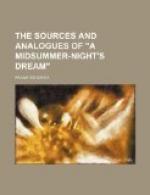[They] raise hail, tempests, and hurtful weather, as lighting, thunder, &c.... These can pass from place to place in the air invisible.... These can alter men’s minds to inordinate love or hate.... Ovid affirmeth that they can raise and suppress lighting and thunder, rain and hail, clouds and winds, tempests and earthquakes. Others do write that they can pull down the moon and the stars.... They can also bring to pass, that, churn as long as you list, your butter will not come.
Book III, chap. iv.
The Fairies do principally inhabit the mountains and caverns of the earth, whose nature is to make strange apparitions on the earth, in meadows or on mountains, being like men and women, soldiers, kings, and ladies, children and horsemen, clothed in green, to which purpose they do in the night steal hempen stalks from the fields where they grow, to convert them into horses, as the story goes.... Such jocund and facetious spirits are said to sport themselves in the night by tumbling and fooling with servants and shepherds in country houses, pinching them black and blue, and leaving bread, butter, and cheese sometimes with them, which, if they refuse to eat, some mischief shall undoubtedly befall them by the means of these Fairies; and many such have been taken away by the said spirits for a fortnight or a month together, being carried with them in chariots through the air, over hills and dales, rocks and precipices, till at last they have been found lying in some meadow or mountain, bereaved of their senses and commonly one of their members to boot.
Book III, chap. xvi.
It may not be omitted that certain wicked women ... being seduced by the illusion of devils, believe and profess that in the night-times they ride abroad with Diana, the goddess of the Pagans, or else with Herodias, with an innumerable multitude, upon certain beasts, and pass over many countries and nations in the silence of the night, and do whatsoever those fairies or ladies command.
Book IV, chap. x.
Indeed your grandam’s maids were wont to set a bowl of milk before him and his cousin, Robin Goodfellow, for grinding of malt or mustard, and sweeping the house at midnight; and you have also heard that he would chafe exceedingly, if the maid or goodwife of the house, having compassion of his nakedness, laid any clothes for him, besides his mess of white bread and milk which was his standing fee. For in that case he saith: What have we here? Hemton hamton[1], here will I never more tread nor stampen.
Book V, chap. iii. “Of a man turned into an ass, and returned again into a man, by one of Bodin’s witches: S. Augustine’s opinion thereof.” (See p. 30.)




